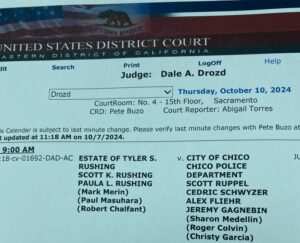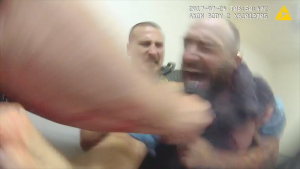by Dave Waddell
posted Oct. 11
SACRAMENTO — A veteran police practices expert told a jury Thursday (Oct. 10) that it was “imaginary fear” that led Chico police to tase a seemingly incapacitated Tyler Rushing.

That consultant, Roger A. Clark of Santee, testified in federal court that Rushing “was no longer a credible threat” when officer Alex Fliehr jolted his body with a taser shot as Rushing lay semi-prone on the bloody floor of a downtown Chico business on July 23, 2017.
Tyler’s parents, Paula and Scott Rushing of Ventura, also testified emotionally Thursday. Jurors heard too from disagreeing experts about whether the burst of electricity from Fliehr’s taser could have contributed to Tyler’s death.
Testimony from the defense’s expert witnesses was expected to resume today (Oct. 11) and continue Tuesday in the U.S. District Court for the Eastern District of California at the Robert T. Matsui Federal Courthouse in Sacramento. Judge Dale Drozd told the five-man, three-woman jury that he expects their deliberations on a verdict in The Estate of Tyler Rushing v. City of Chico will begin Wednesday.
Clark, who worked 27 years for the Los Angeles County Sheriff’s Department, including 15 years as a lieutenant, said he has consulted on thousands of police practice cases since 1993. He said he consults only on cases in which he has found that officers violated professional standards for police performance, or in support of officers who upheld those standards.
Clark said he concluded the tasing of the 34-year-old Rushing after he had been shot three times, including twice by Chico police Sgt. Scott Ruppel, “should never have occurred.”
“It was not an objectively reasonable fear,” Clark said of officers’ stated worries that Rushing might unleash a sneak attack on them. “Imaginary fear is not justification for the use of force.”
“I’ve never seen [those tactics] in the entirety of my career. … ” — Roger Clark
During a siege involving several officers and a biting police dog, Rushing, with Ruppel grabbing his throat, stabbed the sergeant in the neck with a ballpoint pen that he probably pulled from an officer’s shirt pocket while flailing. Though his injury was minor, Ruppel responded with two bullets from his Glock, sending Rushing to the floor, apparently still clutching the pen.

“It’s not a typical weapon,” said Clark, displaying his own pen for the jury. “Even if he had a pen, you should not tase him. … I do not consider a pen in the hand a credible threat. Simply take it out of his hand and handcuff him.”
Clark was asked about claims by Chico officers and their attorneys that it is common for police to deal with suspects “playing possum” before an attack.
“I’ve heard such statements,” Clark said. “I’ve never seen [those tactics] in the entirety of my career. … I’ve never seen an individual shot three times get back on their feet and start fighting.”
Any resistance Rushing might offer, Clark said, could easily have been thwarted with “grappling methods.”
While the trial is primarily focused on whether Fliehr’s use of the taser was excessive force and, if so, whether officers Cedric Schwyzer and Jeremy Gagnebin should have intervened to stop it, Clark also was critical of Ruppel’s actions as the incident’s commanding sergeant.
On the night he died, Rushing was holed up in a restroom at Mid Valley Title & Escrow claiming, falsely as it turned out, to have a gun. Ruppel testified he rammed open the restroom’s door to get Rushing the medical attention he desperately needed.
“Why would you beat down a door when a guy announces he has a gun?” Clark said.
Clark also criticized Ruppel for leaving the building with a minor neck injury just prior to the tasing without putting someone else in charge.
“Sgt. Ruppel had command responsibility,” Clark said. “If he’s going to leave the scene, he has to designate a change in command.”
Paula Rushing’s testimony brought audible weeping at moments from among a half-dozen Chico residents in attendance at the trial Thursday. At one point, her husband hurried out of the courtroom in tears.
Paula told the jury of Tyler’s birth at a birthing center with “orange and yellow flower wallpaper,” and of the devastating news of his death.

“I feel a hole in my heart,” Paula said. “I counted on him for moral support; he counted on me for advice. We had frequent heart-to-heart conversations.”
Paula, a longtime elementary school teacher, said a return to teaching became impossible for her after Tyler’s death because she would see boys who reminded her of him.
Paula was asked by plaintiff’s attorney Robert Chalfant whether she and Scott had wanted grandchildren.
“We were hopeful of that, yes,” Paula replied.
Paula told the court she still experiences “flashbacks” from videos of the bloody scene of Tyler’s death and sees a psychiatrist for depression.
Scott Rushing followed his wife to the witness stand, at one point burying his face in a Kleenex for several seconds before he was able to tell the jury about his only son.
Scott said Tyler was “best friends” with his younger sister, Hillary, who has a disability.
Before his death, “we knew Tyler would be there to take care of Hillary” after her parents died, Scott said.
A low point in the proceeding came Thursday in testimony from defense expert witness Mark Kroll, described as biomedical scientist specializing in bioelectricity.
Kroll blurted out that Rushing might not have felt the pain of the tasing because he was under the influence of methamphetamine. Mark Merin, lead attorney for the Rushings, immediately called for a lawyerly discussion with the judge, after which Drozd told the jury Kroll was “completely mistaken,” that “there is no such evidence” of any illegal drug use by Rushing, and that Kroll’s remarks were stricken from the court record and not to be considered by the jury.
Kroll apologized profusely, saying he had confused the Rushing case with another of his consultancies.
Dave Waddell is a contributing writer to ChicoSol and is covering the civil rights trial over the tasing of the late Tyler Rushing.

When you enter the Butte County jail it’s shocking how old and dirty it looks . It feels like you’ve just entered a third world jail . Made me wonder where all the money Butte County jail has received is going because it certainly hasn’t gone into fixing the unhabitable conditions . To many inmates have died in this jail or were transferred out right before dying and Butte County rushed around to release the inmate right before so it wouldn’t be considered an in costody death but even when they do investigate it’s them investigating themselves. I’ve heard from hundreds of inmates of the Butte County jail over the years telling me about their civil rights being violated all the time as well as many inmates deaths that should have been investigated but Butte County jail covered it up . This jail needs to be shut down and the predators that work there held accountable for their actions.
It is so important that the public understands the details of the last moments of Tyler’s life, and how terribly Chico PD botched the entire encounter, leading to his unnecessary death. Roger Clark’s testimony is so crucial – busting wide holes in the CPD’s story. Their treatment of Tyler was cruel and inhumane, and Clark makes that remarkedly obvious.
Many thanks to Dave Waddell for your continuing and thorough coverage of this Chico PD terrible debacle. Prayers that this legal challenge to police getting away with murder will lead to deep changes in CPD practices.
My heart goes out to Scott and Paula Rushing, for you to have to relive these painful events to achieve justice for your son. If it is any comfort, Tyler’s death and your legal challenges may serve to radically alter police culture. Many blessings to you.
Thank you for covering this trial for those of us who can’t physically be there. I want to see justice for the Rushing family.
As I sit here with tears streaming, I feel compelled to offer my support for the Rushing’s, it’s been said, evil flourishes when a good man does nothing.. what wasn’t said is how extremely hard it would be and the sacrifices that would have to be made.. on many levels. For too long Butte County has not been held accountable, I don’t understand how the DOJ or FBI has not stepped in, they have to be aware. There are so many men and womens civil rights that have been violated and they don’t even realize it because they are not attorneys, when an inmate says my attorney didn’t help me, they are not aware of how they didn’t help them, but what was done to hinder them.
I know of attorneys who will not travel into the BCSC to represent clients, because they value their career.
The repairs needed in the BCJ have not been addressed, but they did install a camera in the BC jail law office where an inmate can go for help with legal questions and information, only they installed it behind the attorney facing their computer, and when the guards remove the inmates to search the cell for contraband, the inmates court documents disappear. Most BC employees, judge’s, court clerks, parole officers, etc. are paid over 100% of the national average, maybe that’s where the money goes.
99 % of the inmates of BCJ have a meth problem, that leads to arrest, incarceration/ criminal record, homelessness and illness, a vicious cycle that is not addressed and all paid for by..tax payers, if they are able to seize jewelry, vehicles, or property to sell either at a BC local or online auction they do get a portion of that money or split with the DOJ.
Since they are so comfortable in their orchestrated routine they forget about the 1% who can see and figure out that something is very wrong and is willing to ask questions and challenge them, or like Tyler Rushing, who has a loving family that knows when something is very wrong, they’re willing to go the the ends of the earth, to challenge them, enduring the pain and sacrifice, because it’s the right thing to do. The government won’t step in to help or investigate to fix the problem.
I believe the employees, not over the 100% national average would appreciate going to work everyday in a transparent and legitime environment.
My thoughts and prayers are with Mr. and Mrs Rushing !
Butte County has got some very serious issues within it’s judicial system. I fear for the lives of anyone arrested in this County . The Butte County citizens need Mark Merin to investigate all of the civil rights violations and deaths that have been covered up for many years and not to mention the fact that the since 2007 the women’s side of the jail was deemed inhabitable by the Grand jury but it’s now 2024 and they never stopped housing the women. Records also state that the jail has been understaffed an average of seventeen to eighteen employees on a daily basis for years. Butte county jail and it’s employees are the predators .It’s time someone like Mark Merin look into all of the corruption and abuse that’s gone on for way too many years.
Look up the Ron Settles case in Long Beach, California in 1981. LEO in Signal Hill had lots of “rejects” from LAPD. Just as Butte County does. I was living in Long Beach at the time. I was young and naive then. I had no idea as I aged I read about many “Ron Settles”.
Ron Settles was found hanging in his cell just hours after his arrest. Read an article on Ron Settles to see what really happened. Smaller towns and cities are infamous for hiring officers who’ve done horrible things to citizens in other areas. Sadly it’s a practice here.
Healing blessings to the Rush family. I’m so sorry Tyler. You deserved better.
Christopher, how to we get Mark Merin. I’d love to help!
Warmest regards,
Deb
Shocking information.